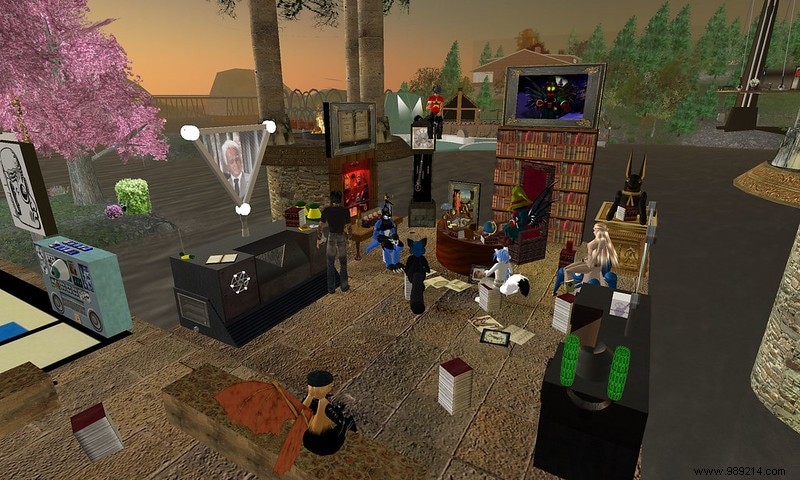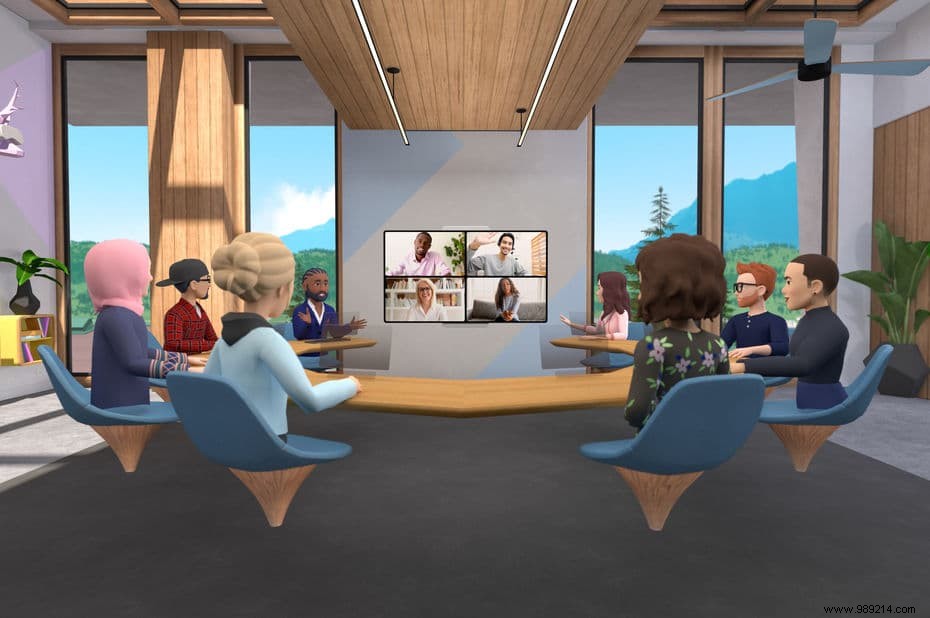The term "metaverse" (a contraction of meta-universe) was first coined by Neal Stephenson, an American science fiction writer. In his novel Snow Crash (French title:The Virtual Samurai ), published in 1992, it describes an apocalyptic futuristic universe, from which the characters can momentarily escape by plunging into a universe of virtual reality, in which everyone can evolve through their avatar.
This metaverse, then, is a glimpse of how an Internet based on virtual reality could evolve in the near future:a fictional virtual world, composed of several distinct and persistent spaces, populated by avatars controlled by users. If the concept was thought up by Stephenson about thirty years ago, the term has come back to the fore since Mark Zuckerberg let it be known that he wanted to develop a metaverse.
Facebook - recently renamed Meta - has just corroborated its statements by announcing the creation of 10,000 jobs in Europe, dedicated to this new major project - in particular to the manufacture of virtual and augmented reality devices necessary to access to the future metaverse. According to Zuckerberg, virtual reality headsets will eventually become as ubiquitous as smartphones. But what exactly is this "set of maximalist and interconnected experiences" on which Meta's metaverse will be based?
Virtual spaces, in 3D, shared and connected to each other to form a whole universe, this is the basic idea of the metaverse. But most importantly, these are persistent spaces — which sets the metaverse apart from most multiplayer online games, which typically only provide access to non-persistent instances. New technologies are truly the catalysts for the transition from the current Internet to this futuristic concept; these technologies encompass extended reality, artificial intelligence, blockchain, computer vision, cloud computing, video conferencing, live event broadcasting and future mobile networks.
The metaverse ecosystem must allow users to "live", via their avatar, in an autonomous, persistent and shared domain. Human social interaction will also be the central element of the metaverse. It should be understood, however, that this is not a game and will not be owned by a single company. You really have to imagine the metaverse as a global Internet, but in 3D, where all information and communication services and tools will be interoperable and will offer a completely immersive user experience. It will be possible to work in this metaverse, but also to attend concerts or enjoy other hobbies, just like in the real world.
Just as you might create a document in Microsoft Word, then send it via Gmail to a colleague for them to read on an iPad, the elements that make up the metaverse will need to move from one product/service to another. another, while retaining their value and function. The Open Metaverse Interoperability Group was specifically created to promote a future where different metaverses share their technology so that avatars can seamlessly switch between avatars — the same way one can currently switch between avatars. website to another on the Internet without changing browsers.
It's not really one, but the metaverse has several points in common with online multiplayer games, which also offer shared interactive worlds. The game Second Life , released in 2003, was the first example of the closest thing to a metaverse:a 3D virtual universe created by users themselves through their avatars.
No mission to accomplish or specific objective to achieve; the principle is to evolve as well as possible in this virtual world, by buying goods (with the currency of the game, the Linden dollar, convertible into American dollars), by exchanging services, by organizing events, etc. At its peak, the game had almost a million regular users. The Duran Duran group even organized concerts and created their own space within this universe in 2006.

Linden Lab, which developed the game, manages the graphics rendering and maintains the equipment needed to host the data. But from 2007, weakened among other things by the subprime crisis, the game aroused less interest and many companies having created shops within this universe decided to leave the adventure, spaces were left abandoned, etc But Second Life still exists! In 2019, Linden Lab claimed 800,000 users logging in at least once a month.
The creator of the game Roblox , David Baszucki, also has the firm intention of investing in the metaverse. Released in 2004, the game is sandbox; the principle is to create games, then to introduce them to other players. "Just as mail, telegraph, telephone, text and video are utilities for collaborative work, we believe that Roblox and the metaverse will become essential tools for business communication he told the New York Times . Note that Roblox Corporation acquired last year the start-up Loom.ai, specializing in the creation of virtual avatars capable of reproducing the personality traits of their user by machine learning. In April 2021, the Roblox platform would have reached 202 million unique users.
Tim Sweeney, the leader of Epic Games - major player in the video game industry, at the origin of Fortnite among others — is obviously very interested in the metaverse. Fortnite has largely evolved in this direction, by including concerts, brand events and much more in its own digital world. Last August, millions of Ariana Grande fans, for example, were able to attend a series of concerts through the game. And as soon as a blockbuster is about to be released in cinemas, players can endorse the “ skins” associated with the movie in question.
But the partnerships could go much further:Sweeney recently told the Washington Post that he envisions a world where an automaker wanting to advertise a new model can drop their car into that world in a way that users can try it. Similarly, during an online shopping session, it might be possible to try on digital clothes, with their avatar, and then order them to be shipped to the real world.
All that remains is to imagine all these experiences, not behind a screen, but by being totally immersed in these universes by means of virtual and augmented reality equipment:this is what the metaverse should look like.
The metaverse is therefore generating great excitement among high net worth investors and big tech companies, including Meta; and for good reason, everyone wants to be ready to integrate this future version of the Internet. In this context, the company has invested heavily in virtual reality — starting in 2014, when it acquired the Oculus VR company for $2 billion; its latest product, the Oculus Quest 2, released a year ago, has sold over 5 million units, breaking all virtual reality headset sales records! A new version of the product, even more perfected, should soon see the light of day.
At his company's most recent annual conference, held on October 28, Zuckerberg clarified his own vision for the metaverse. This will combine augmented reality and virtual reality universes, in which users will be able to interact through their digital avatars. It will be possible to work remotely with colleagues, in virtual offices, or to have fun, as mentioned above. Meta's platform should also integrate a virtual version of Facebook Marketplace, through which it will be possible to sell digital products and services.

Meta has already developed several virtual reality applications:Facebook Spaces — a virtual reality social networking app launched in 2017 — is now replaced by Horizon Worlds ; a change that is a continuation of the collaborative work application Horizon Workrooms launched this summer, which can bring together up to 16 people in virtual reality, represented by their avatars.
Also note the upcoming arrival of Horizon Home , a home environment for the Oculus Quest, which will offer the possibility of inviting friends to its own space, then chatting or launching applications with them in VR. Customization options for this space — similar to those offered in the old Oculus Rooms app — are also on the program. By laying milestones in the personal and professional spheres of its users, Meta is gradually building the foundations of its future metaverse.
In Q1 2021, Facebook/Meta claimed 2.85 billion monthly active users and 1.88 billion daily active users worldwide. If all of these people made it into the metaverse, it could become the biggest VR experience yet. But according to the company, the metaverse as such will not see the light of day for at least 10 to 15 years. And for good reason:these advanced digital worlds will need better, more consistent and more mobile connectivity – a problem that should be solved with the deployment of 5G, however.
The decentralized technology on which cryptocurrencies are based, the blockchain, will also play a major role in the economy of this virtual universe. The growing interest in NFTs, which allow the ownership of digital assets to be reliably tracked, could give an idea of how this economy works. NFTs, “non fungible tokens », are unique, non-reproducible and non-interchangeable digital tokens, which make it possible to authenticate a real or virtual object (an image, a video, an audio file, etc.).
For example, on the Decentraland platform — an open-source interactive virtual reality platform where users can buy, use and build on virtual land — the system guarantees its users full ownership rights, as well as a permanent record of ownership on the Ethereum blockchain. The currency used, called MANA, is used to buy NFT land or artwork; auction house Sotheby's owns land on Decentraland where it has built a replica of its London galleries.
When it comes to collaborative work, visiting art galleries, attending a concert, trying out a new car or new clothes, the metaverse concept could indeed provide an unprecedented experience; when it comes to carrying out a simple research on Wikipedia or declaring your taxes online, this Internet of the future in 3D seems on the other hand a tad disproportionate (!).